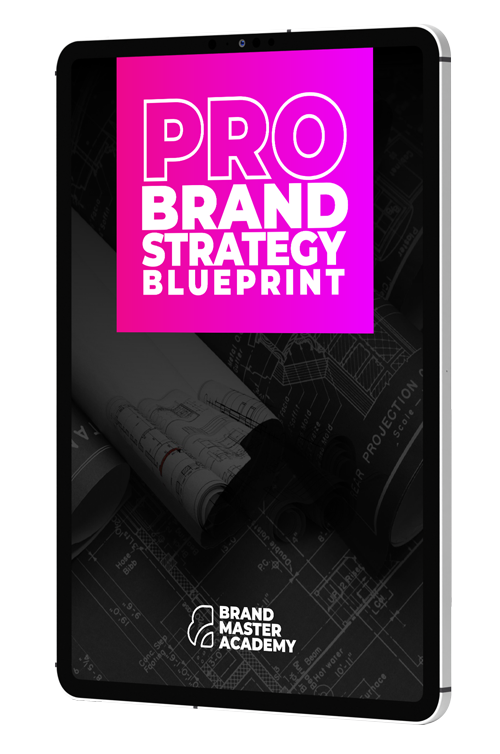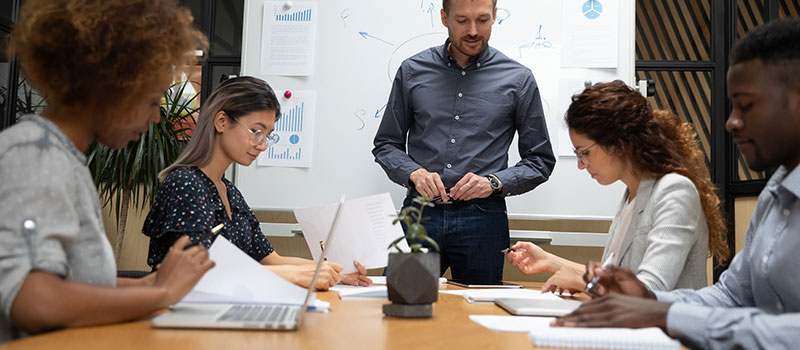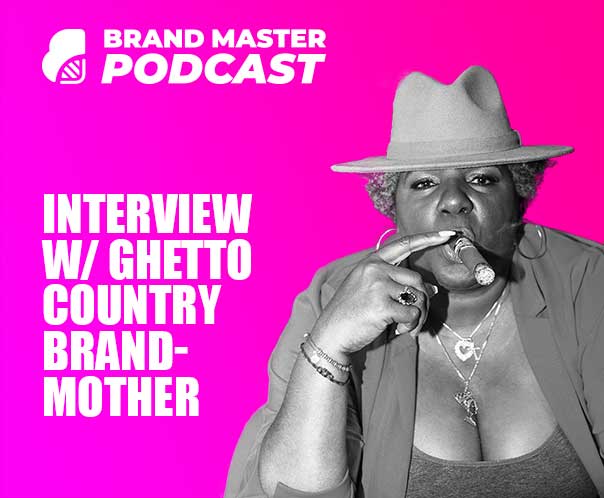Brand strategy workshops are essential tools for branding specialists. They provide a collaborative space for brand builders to discuss their ideas and forge a way forward.
Every good strategy workshop needs a facilitator to keep the task on track and ensure the meeting is as productive as possible.
Typically, in a brand-building project, this is the brand strategist or brand consultant.
But being a workshop facilitator requires a specific skill set that helps the process run smoothly.
The good news is that anyone can become a strong facilitator if they nail these skills.
Here are ten skills and techniques you need to be a top-tier workshop facilitator.
What Is a Facilitator?

A facilitator is a person in a workshop who takes control to guide the team through the process.
Unlike a regular meeting, this individual is not necessarily further up in the company hierarchy, and they are not there to run the meeting as a head.
Instead, a facilitator is there to keep everyone moving toward the common goal and ensure everybody has space to share their ideas.
They are not there to solve the problem but to ask questions, evoke answers and encourage collaboration and teamwork.
Furthermore, they help to avoid the common pitfalls of company workshops, such as groupthink and team politics.
Skilled facilitators have a very important role in strategy workshops because they can ensure the best outcomes, but to achieve this, they need to manage the discussion smartly.
What Skills Does a Facilitator Need?

A good facilitator possesses a collection of unique and valuable skills that help to uncover the best solutions for a particular challenge.
Though it might seem like great facilitators are born, most of their skill sets are learned.
Here are ten key skills to master if you want to excel at workshop group facilitation.
PRO Brand Strategy BluePrint
Build Brands Like A Pro Brand Strategist

#1. Clear Communication

The first, and perhaps the most obvious, thing on the list is communication skills. Any meeting requires clear communication from all its participants, including the team leader.
An effective facilitator needs to ensure that everybody is on the same page, which means being able to communicate the task efficiently to everyone in the room.
The nature of language can mean that people understand instructions differently, but the facilitator is there to establish a shared understanding.
It’s the job of the facilitator to understand the task at hand and make sure everyone else understands it, too.
#2. The Right Mindset

Facilitators need to be in the right mindset.
Remember that you are not the leader; you are not the hero. Instead, you are a guide.
The facilitator is not there to dominate the discussion with their own ideas.
You are there to observe the group, understand the demands of the task, and ensure the workshop moves in the right direction.
That said, you still need some leadership skills to help steer the ship in the right direction. It’s important to take charge without dominating the discussion.
Explore Brand Strategy
Programs & Tools
#3. Effective Time Management

Most workshops have a time limit. If you have one hour to complete a task and spend forty-five minutes stuck on understanding the discussion topic, nothing will get done.
It’s the facilitator’s role to ensure that the group stays on schedule.
It’s helpful to use a time-boxing technique for this, with specific time slots allocated for each activity.
For example, work on icebreakers for ten minutes, an ideation or brainstorming exercise for another ten, then open up the discussion for the rest of the time.
Techniques like this help you ensure the workshop progresses rather than people getting stuck on one thing. The best part is that this is an easy skill to learn as long as you are strict with the timings.
#4. Ability To Stay On Task

A common challenge in group workshops is that people will go off task.
It’s easy to get wrapped up in something and go off on a tangent – this is the nature of group discussions.
Another of the biggest challenges is circular discussions, where group members go around in circles about the same thing.
This prevents the discussion from moving forward.
The facilitator needs to help the group focus on the task at hand, pulling conversations back in when they stray off-topic and cutting off circular discussions before they go too far.
Here are some techniques to help you with this:
Parking Lot: If participants are unwilling to let go of a topic or idea because they feel it’s important, encourage them to write it on a post-it note and stick it on a board in a physical “parking lot”. Leave some time at the end to come back and answer the questions raised that weren’t on the initial agenda.
Note and Vote: If there are multiple ideas competing for attention, give everyone two minutes to write down their thoughts on post-its. Stick them on a board, then allow everybody to look at the ideas on the wall and vote on them . That way, you can easily see the majority decision.
Note Everything: Sometimes, participants will add to the discussion with points that you might not feel are relevant. As the facilitator, this doesn’t matter. Make sure you note down everybody’s ideas no matter what, so that participants feel heard. They’re far more likely to continue engaging when they feel their input is being heard.
#5. Positive Energy

Anyone who has attended a workshop before will know that it can be draining. This is especially true if the group gets roped into circular discussions or any heated debates.
The facilitator needs to keep the group energized and positive, and it’s a classic case of leading by example.
As the facilitator, you need to have a positive mindset and bring high energy levels to the group.
Some people will still get tired, naturally.
Keep an eye out for this happening, and try to keep the momentum up when it does.
Depending on the length of the workshop, some facilitators have handy techniques to stay on task.
For example, a break in the middle of the session where everybody gets onto their feet for a couple of minutes can keep energy levels up.
Alternatively, take a break to play a game.
It also helps to celebrate when you reach milestones or solve a problem. It keeps morale high and reminds participants that they’re achieving something.
#6. Nuetrality

Groupthink and skewed team dynamics are unavoidable in work sessions.
The facilitator needs to try to prevent these challenges as much as possible through well-designed sessions.
The idea is to prevent one person – usually the most senior participant or the one with the biggest personality – from taking control of the session.
The Note and Vote technique mentioned above is also great for this problem.
It ensures that everybody in the group gets a say, even those who are quieter and less willing to speak up.
Doing this near the start of the session means that everybody’s ideas are heard before someone has a chance to seize control.
It also helps to find a common ground early on, working democratically rather than letting someone dominate.
#7. Ability To Deal With Troublemakers

Similarly, troublemakers are unavoidable. If you facilitate multiple workshops, there will inevitably come a time when you have to deal with someone trying to disrupt the group.
A great facilitator is someone who can quickly nip this in the bud before the troublemaker brings down the energy and derails the discussion.
The Parking Lot method is useful here again because it means you can put a pin in the conversation for later.
If a participant is being challenging and asking irrelevant questions, just say,
“that’s a really great question, do you mind writing that down so I can come back to that later?”
Make sure you leave some time at the end to cover these questions.
As the facilitator, it’s your job to make sure people feel heard, and this is the way to do so.
It’s important to handle it delicately because if the troublemaker feels that you aren’t listening to them, you risk making them angrier and escalating the situation. It’s useful to have some conflict resolution skills in case of emergency, even though heated conflict is not typically likely.
#8. Clear Guidance

Clarity is a vital skill for any workshopper. A workshop always has a reason behind it, a particular task that needs to be addressed, or a problem that needs to be solved.
As the facilitator, you need to make sure everyone understands the task and has a way to solve it.
However, if you design tasks to get people thinking about the issue, and you have to explain the task three times before people get it, then you have actually made the process more complicated.
It’s all about being a good teacher.
Make sure you explain to the participants WHAT the problem is, WHY it’s a problem, and HOW you are going to try and tackle it.
#9. Adaptivity

Even the best-laid plans go awry, and the same is true of workshops.
There are so many things that could go wrong, from troublemakers derailing the discussion to running over time, or even your technology set-up malfunctioning. In some cases, you can’t control the challenges you will face.
Since there is no way to avoid these incidents, the best thing you can do is be flexible.
Facilitators need to adapt well to any given situation and be able to handle it without panicking.
Sometimes, this comes with experience, so the more you lead workshops, the better you will get.
#10. Active Listening

Everything about running a successful workshop comes back to the same thing: making people feel heard.
Active listening skills are, therefore, some of the most critical abilities for a facilitator. You don’t just need to listen to the discussion, but really hear and understand what people are saying.
You can make people feel heard initially by maintaining eye contact and ensuring your body language is receptive.
However, you also need to show that you’re listening with techniques like noting and by answering questions thoroughly.
Facilitators should also respect everyone’s contribution and hear what people say without judgment or evaluation. Remember that you are there to guide the topic, not be the hero of the discussion.
How to Lead Groups Effectively

There are several facilitation techniques you can use as a facilitator to make sure every session runs as smoothly as possible.
Ask Great Questions

The facilitator needs to ask the right questions to help guide people through the discussion.
Asking questions might seem easy but the combination of tone and simplification is key.
If your question doesn’t posess the right tone or energy or if your questions is confiusing, group participation will drop.
Each question should encourage the participants to think about a smaller piece of the task, helping them break things down into manageable pieces.
Manage Participation

The point of a workshop is to get everyone to share their ideas. Any group of people is going to have more talkative members and quieter ones.
As the facilitator, you need to encourage even the quiet participants to share their ideas.
Getting the “over-talkers” to listen to others can be a challenge, but facilitators need to find ways to get everyone to share equally.
Calling participants out by name and asking for their specific input is a great way to keep the balance of participation.
Build A Toolkit

If you run workshops regularly, a toolkit can help you by providing structure.
Start with a collection of icebreakers or team building exercises you like to use to build rapport and trust.
Icebreakers can also help you, the facilitator, learn about the team members and get an inkling of people’s opinions and roles in the group.
Then, gather some techniques and interactive activities you want to use with your participants.
Activities can vary depending on the topic of the workshop, but some facilitators have adaptable activities they like to use as much as possible.
Facilitating Workshops Remotely

Remote work is increasingly common to the point that it’s become the norm, and facilitators are finding themselves faced with remote workshops.
There are new sets of challenges posed by remote workshops as opposed to those in-person, with increased reliance on technology, more talking over each other, and reduced focus.
However, good facilitators can manage a successful workshop even when facilitating from afar. Here are some tips:
Make sure everyone stays muted when not talking
Have a backup plan for each piece of technology you plan to use
Leave more time for discussions
Make sure your tasks, games, and activities will work for everyone
Over To You
When it comes to facilitating, practice makes perfect. It might sound cliche, but the more scenarios you have encountered while workshopping, the better you will get at adapting to unexpected challenges and understanding people.
Also, there is no one way to facilitate brand-building workshops. Each facilitator tackles things differently, so lean into your strengths.
If you are particularly good at keeping people happy and energized, focus on that as your strength and prepare some fun energizers to keep people going.
Anybody can be a good facilitator if they work on these skills. Next time the opportunity arises, be ready to dive in and try your hand at workshop facilitation, and you will be facilitating like a pro in no time.
On-Demand Digital Program
Brand Master Secrets
Make the transition from hired-gun to highly valued brand strategist in less than 30 days. The systems, frameworks and tools inside this comprehensive program are all you need to level up.








